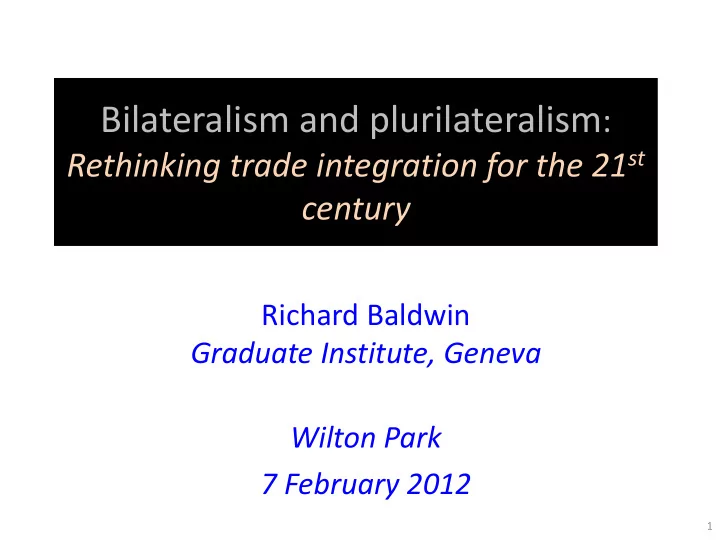

Bilateralism and plurilateralism : Rethinking trade integration for the 21 st century Richard Baldwin Graduate Institute, Geneva Wilton Park 7 February 2012 1
My comments • Why rethink necessary? • Globalisation as 2 ‘unbundlings’ not 1. • Transformed international commerce; • Transformed trade barriers; • Transformed political economy of liberalisation. • Implications for WTO 2020.
1 st unbundling Steam revolution Bay A Bay B Bay C Global dispersion of production, but local clustering into factories: Coordination costs not trade costs
1 st unbundling 2 nd unbundling ICT revolution Bay Bay Steam revolution A B Bay A Bay B Bay C Bay C Bay A Bay B Bay C Dispersion of production Global dispersion of production, stages, but regional clustering (‘factory Asia’, ‘factory EU’, but local clustering into factories: Coordination costs not trade costs etc.)
Transformed international commerce: “ Trade-investment-services-IP nexus ” Bay Bay Bay Bay A B A B Bay Bay C C Bay A Bay B Bay C “ Trade-investment-services-IP nexus”
Transformed of trade barriers • 20 th century = goods crossing borders. – Trade barriers simple; agreements simple (GATT 1947 & “shallow” RTAs); mostly about tariffs . • 21 st century = Trade-investment-services-IP nexus. – Two new things: (1) Connecting factories; Border barriers; Infrastructure services, Biz mobility, etc. (2) Doing business abroad. “Behind the border barriers” (BBB ): protect capital, IP, local business climate, competition policy (esp. state-owned enterprises), etc. 6
Transformed political economy • 20 th century bargain = my market for yours. • 21 st century bargain = Northern factories for Southern reform. – e.g. the TPP agenda, Japan-Thailand, etc. • Huge new demand for beyond-tariff liberalisation: – “Headquarter” economies want assurances; – “Factory” economies want offshored jobs/investment. • Why these deals struck outside WTO? – No factories on offer in Geneva. 7
Must think differently 1. Forget Bhagwati’s “building & stumbling blocks”. – Forget trade diversion: Today’s FTAs are not mostly about tariffs & not very discriminatory. – BBBs cannot be thought of as tariffs without revenue. • Few deep FTA provisions have ‘rules of origin’. • More like ‘slanted’ MFN liberalisation . 2. FTAs threaten WTO centrality on rules, not tariffs. 3. Regional supply chains & RTAs. – Best at national, regional or global level? (fiscal federalism) 4. New political economy push for deeper disciplines. 8
WTO 2020, FTAs & Plurilaterals • Assertion #1: – WTO liberalisation shut down till 2020. • Assertion #2: – Huge demand for deeper disciplines. • Conclusion: – FTAs & plurilaterals are way forward rest of this decade. • Implications: – Must struggle to ‘ multilateralise regionalism’. – Must find ways to get WTO into the ‘next generation’ trade issues (i.e. 21 st century trade disciplines). 9
Future scenarios for WTO • Plan A (WTO centricity restored): – DDA done & move updated WTO disciplines to match 21 st century trade. • Plan B (WTO centricity erodes futher): – WTO unreformed, RTAs & BITs continue to lead. • B.1: WTO stays vibrant with Marrakesh disciplines only; deeper disciplines outside. – WTO is “first pillar” of world trade systems. • B.2: WTO credibility withers; bicycle falls over. – Drift back towards a 19 th century Great Powers world? 10
MFNs, RTAs, Unilateralism, Membership GATT Kennedy Tokyo Uruguay Doha signed Round Round Round ends Round 50 16% ends ends WTO born begins 45 14% 13% 40 New RTAs (number of agreements) 12% 12% 35 New WTO members 10% 30 (number of nations) 10% 9% 25 8% GATT/WTO Round in progress 6% 20 6% World average tariff (right 15 scale) 4% 10 2% 5 0 0% 1947 1949 1951 1953 1955 1957 1959 1961 1963 1965 1967 1969 1971 1973 1975 1977 1979 1981 1983 1985 1987 1989 1991 1993 1995 1997 1999 2001 2003 2005 2007 Sources: RTAs: WTO online databases & Hufbauer-Schott RTA database; tariffs: Clemson and Williamson (2004) up to 1988, then World DataBank (weighted tariffs all products) 11
Recommend
More recommend